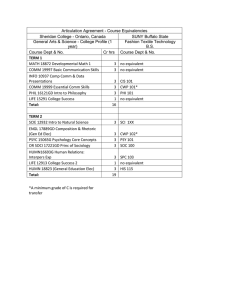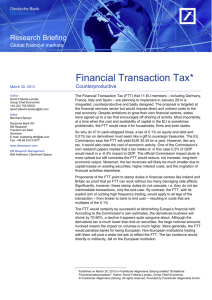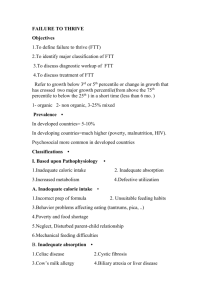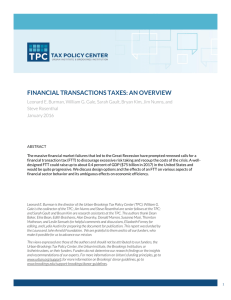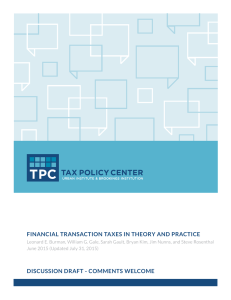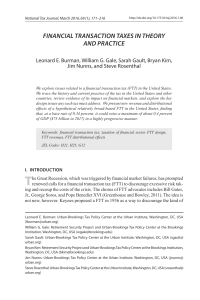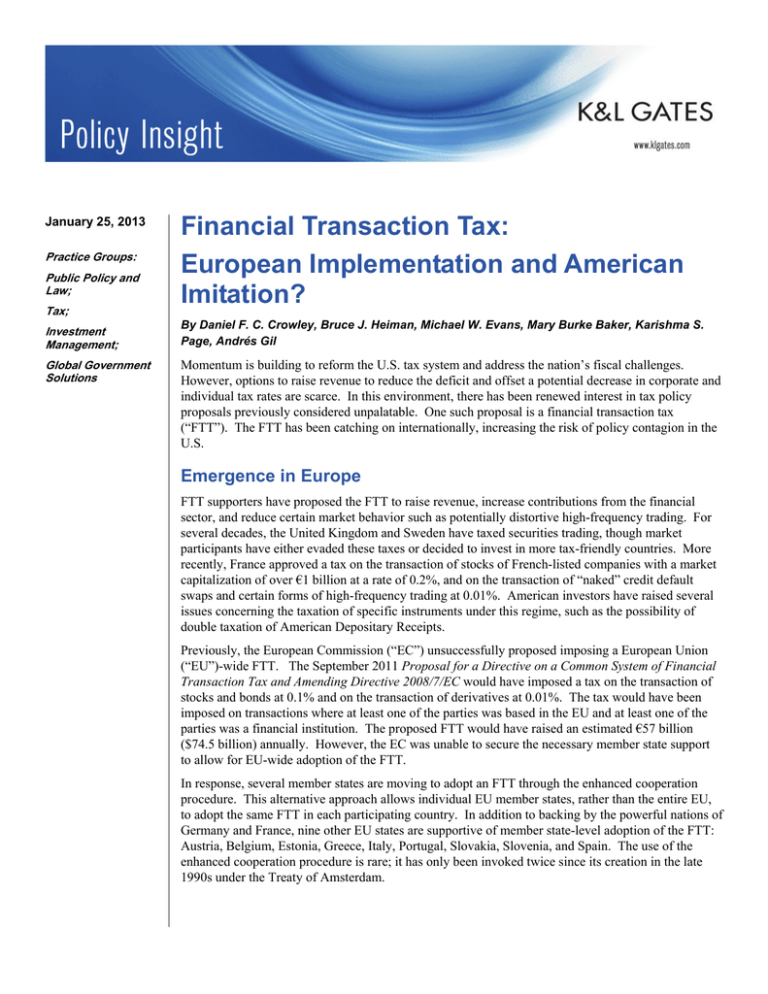
January 25, 2013
Practice Groups:
Public Policy and
Law;
Tax;
Investment
Management;
Global Government
Solutions
Financial Transaction Tax:
European Implementation and American
Imitation?
By Daniel F. C. Crowley, Bruce J. Heiman, Michael W. Evans, Mary Burke Baker, Karishma S.
Page, Andrés Gil
Momentum is building to reform the U.S. tax system and address the nation’s fiscal challenges.
However, options to raise revenue to reduce the deficit and offset a potential decrease in corporate and
individual tax rates are scarce. In this environment, there has been renewed interest in tax policy
proposals previously considered unpalatable. One such proposal is a financial transaction tax
(“FTT”). The FTT has been catching on internationally, increasing the risk of policy contagion in the
U.S.
Emergence in Europe
FTT supporters have proposed the FTT to raise revenue, increase contributions from the financial
sector, and reduce certain market behavior such as potentially distortive high-frequency trading. For
several decades, the United Kingdom and Sweden have taxed securities trading, though market
participants have either evaded these taxes or decided to invest in more tax-friendly countries. More
recently, France approved a tax on the transaction of stocks of French-listed companies with a market
capitalization of over €1 billion at a rate of 0.2%, and on the transaction of “naked” credit default
swaps and certain forms of high-frequency trading at 0.01%. American investors have raised several
issues concerning the taxation of specific instruments under this regime, such as the possibility of
double taxation of American Depositary Receipts.
Previously, the European Commission (“EC”) unsuccessfully proposed imposing a European Union
(“EU”)-wide FTT. The September 2011 Proposal for a Directive on a Common System of Financial
Transaction Tax and Amending Directive 2008/7/EC would have imposed a tax on the transaction of
stocks and bonds at 0.1% and on the transaction of derivatives at 0.01%. The tax would have been
imposed on transactions where at least one of the parties was based in the EU and at least one of the
parties was a financial institution. The proposed FTT would have raised an estimated €57 billion
($74.5 billion) annually. However, the EC was unable to secure the necessary member state support
to allow for EU-wide adoption of the FTT.
In response, several member states are moving to adopt an FTT through the enhanced cooperation
procedure. This alternative approach allows individual EU member states, rather than the entire EU,
to adopt the same FTT in each participating country. In addition to backing by the powerful nations of
Germany and France, nine other EU states are supportive of member state-level adoption of the FTT:
Austria, Belgium, Estonia, Greece, Italy, Portugal, Slovakia, Slovenia, and Spain. The use of the
enhanced cooperation procedure is rare; it has only been invoked twice since its creation in the late
1990s under the Treaty of Amsterdam.
Financial Transaction Tax:
European Implementation and American Imitation?
In late 2012, the EC and the European Parliament gave their consent for an FTT to move forward. On
January 22, 2013, the Council of the European Union authorized the eleven member states to adopt an
FTT through the enhanced cooperation procedure. As a next step, a revised proposal, based on the
September 2011 proposal with some amendments, will be released and will have to be adopted by
unanimous agreement of the participating member states. An FTT may be in place as early as January
2014. It is expected to generate €10 billion to €35 billion annually.
Many analysts predict that large financial institutions will shift their trading away from countries that
adopt an FTT, particularly because the FTT will not be adopted in the United Kingdom or in
Switzerland. As a result, small traders, funds, and asset managers without international networks will
most likely bear the brunt of an FTT. These costs may ultimately be passed down to consumers,
either in the form of reduced yields or charges to retirement and savings accounts, instead of the
intended target – financial institutions.
The U.S. and the FTT
Several bills were introduced during the 112th Congress that proposed the establishment of an FTT.
Congressman Keith Ellison (D-MN) introduced H.R. 6411, the “Inclusive Prosperity Act.” The bill
would have imposed a transaction tax of 0.5% on stocks, 0.1% on bonds, and 0.005% on derivatives
or other instruments. Senator Tom Harkin (D-IA) and Congressman Peter DeFazio (D-OR)
introduced companion bills, S. 1787 and H.R. 3313, the “Wall Street Trading and Speculators Tax
Act.” The bill would have imposed a transaction tax of 0.03% on stocks, bonds, derivatives, and other
instruments. Importantly, these pieces of legislation enjoyed the support of other Congressional
Democrats, with H.R. 3313 having over 30 cosponsors. Senator Harkin and Congressman DeFazio
have announced that they will be reintroducing their bills in the coming weeks.
Of course, the FTT has not been without controversy in the U.S. During the 112th Congress,
Congressman Tom Price (R-GA) introduced a bill, H.R. 6616, which would prohibit the Treasury
Secretary from assisting any foreign government with the collection of taxes on transactions occurring
on U.S. exchanges. The U.S. Chamber of Commerce publicly supported H.R. 6616.
Although initial reaction by U.S. policymakers was lukewarm, an FTT may gain traction in the
context of the tax reform and deficit reduction debate. Often overlooked is the fact that the U.S.
government already takes a cut on securities transactions in the form of “Section 31 fees.” Exchanges
collect these fees from investors and forward them to the U.S. Treasury in order to recover the cost of
running the SEC. Section 31 fees generate over a billion dollars in revenue annually. Surplus from
Section 31 fees is “subject to appropriation” and available for general federal government spending
purposes. Given the current fiscal environment and the dire need for revenue, simply expanding upon
this model to collect additional taxes would not be a dramatic leap.
The Joint Committee on Taxation has estimated that the Harkin/DeFazio legislation could raise as
much as $350 billion over ten years. Such an approach may have the benefit of being more politically
palatable than additional modifications to tax rates on income, capital gains, and dividends,
particularly if there are thresholds put in place to exempt most middle-income retail investors.
Moreover, the competitive impact is blunted as the FTT is adopted in EU countries.
U.S. Treasury officials have opposed the FTT because of competitive concerns about the tax’s effect
on U.S. capital markets. Instead, they have proposed a financial crisis responsibility fee that would be
specifically targeted at certain large financial institutions that received government assistance during
the 2008 financial crisis. However, widespread adoption of an FTT in Europe could stem criticism
from the U.S. Treasury.
2
Financial Transaction Tax:
European Implementation and American Imitation?
Conclusion
Given today’s fiscal and political climate, adoption of an FTT proposal across the EU and in the U.S.
is quite possible. Educating policymakers on both sides of the Atlantic about the dangers such a tax
poses to participants in the capital markets is key to containing a possible outbreak.
Authors:
Daniel F. C. Crowley
dan.crowley@klgates.com
+1.202.778.9447
Bruce J. Heiman
bruce.heiman@klgates.com
+1.202.661.3935
Michael W. Evans
michael.evans@klgates.com
+1.202.661.3807
Mary Burke Baker
mary.baker@klgates.com
+1.202.778.9223
Karishma S. Page
karishma.page@klgates.com
+1.202.778.9128
Andrés Gil
andres.gil@klgates.com
+1.202.778.9226
Anchorage Austin Beijing Berlin Boston Brisbane Brussels Charleston Charlotte Chicago Dallas Doha Dubai Fort Worth Frankfurt
Harrisburg Hong Kong London Los Angeles Melbourne Miami Milan Moscow Newark New York Orange County Palo Alto Paris Perth
Pittsburgh Portland Raleigh Research Triangle Park San Diego San Francisco São Paulo Seattle Seoul Shanghai Singapore Spokane
Sydney Taipei Tokyo Warsaw Washington, D.C.
K&L Gates practices out of 46 fully integrated offices located in the United States, Asia, Australia, Europe, the
Middle East and South America and represents leading global corporations, growth and middle-market companies,
capital markets participants and entrepreneurs in every major industry group as well as public sector entities,
educational institutions, philanthropic organizations and individuals. For more information about K&L Gates or its
locations, practices and registrations, visit www.klgates.com.
This publication is for informational purposes and does not contain or convey legal advice. The information herein should not be used or relied upon in
regard to any particular facts or circumstances without first consulting a lawyer.
©2013 K&L Gates LLP. All Rights Reserved.
3




